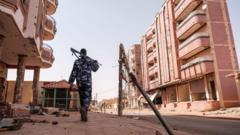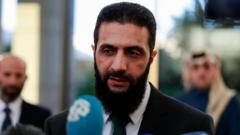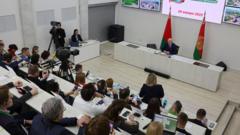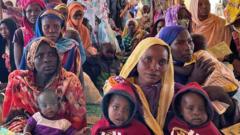Amid the continuing aftermath of the civil war, Syrians express hope and skepticism regarding future accountability for crimes committed under the Assad rule.
**Calls for Justice in Post-Assad Syria: A New Dawn for Accountability?**
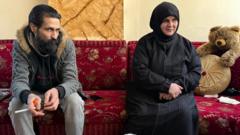
**Calls for Justice in Post-Assad Syria: A New Dawn for Accountability?**
As the Syrian regime shifts after Assad's fall, citizens demand justice for longstanding atrocities.
Umm Mazen’s anguish resonates as she recounts the agonizing years spent searching for her sons, arrested during the protests that ignited the Syrian civil war. The fate of her oldest son, Mazen, was sealed with a death certificate, while the existence of her other son, Abu Hadi, remains a haunting mystery. Countless families like hers have suffered devastating losses, and as she sits in her War-ravaged home, the pain of her family’s destruction lingers. “If divine justice prevails,” she muses, she hopes that Bashar al-Assad "is left in oblivion just like our young men were vanished from this world.”
Advocates for justice, like lawyer Hussein Issa, who have dared to challenge the regime, face an uphill battle. Despite his efforts to defend political prisoners, he underscores the systemic challenges imposed by the regime's terrorism laws that lingers even after its downfall. “Justice must not only be served, but it must also be meted out fairly and impartially,” he argues, advocating for the removal of judges complicit with the former administration.
In the midst of this transitional phase, Khitam Haddad, the newly appointed deputy justice minister, signals a conscious effort to restore civil order. She acknowledges the need for a trustworthy judiciary but advises that the focus should presently be on restoring operational normalcy in courts rather than prosecuting past crimes. While Haddad emphasizes her commitment to a reassuring message, colleagues express concern about a potential continuation of authoritarian practices in the new regime.
As calls for accountability rise, the transitional authorities urge caution regarding justice. Amid videos of public retribution against former regime officials, a lingering question remains about the potential for genuine reform. With remnants of the Assad-era laws still in place and many wary of the new judiciary's capacity, the road to true justice appears long and uncertain.
As Syrians gather in newfound freedom atop the mountains surrounding Damascus, they reflect on the bloodshed and atrocities of the past decade. The collective hope for a future defined by justice and accountability simmers beneath their liberated breaths, asking whether the promise of such a future can truly materialize after so much pain and suffering.
Advocates for justice, like lawyer Hussein Issa, who have dared to challenge the regime, face an uphill battle. Despite his efforts to defend political prisoners, he underscores the systemic challenges imposed by the regime's terrorism laws that lingers even after its downfall. “Justice must not only be served, but it must also be meted out fairly and impartially,” he argues, advocating for the removal of judges complicit with the former administration.
In the midst of this transitional phase, Khitam Haddad, the newly appointed deputy justice minister, signals a conscious effort to restore civil order. She acknowledges the need for a trustworthy judiciary but advises that the focus should presently be on restoring operational normalcy in courts rather than prosecuting past crimes. While Haddad emphasizes her commitment to a reassuring message, colleagues express concern about a potential continuation of authoritarian practices in the new regime.
As calls for accountability rise, the transitional authorities urge caution regarding justice. Amid videos of public retribution against former regime officials, a lingering question remains about the potential for genuine reform. With remnants of the Assad-era laws still in place and many wary of the new judiciary's capacity, the road to true justice appears long and uncertain.
As Syrians gather in newfound freedom atop the mountains surrounding Damascus, they reflect on the bloodshed and atrocities of the past decade. The collective hope for a future defined by justice and accountability simmers beneath their liberated breaths, asking whether the promise of such a future can truly materialize after so much pain and suffering.

